Test analysts play a key role in ensuring the quality and reliability of software applications. They meticulously evaluate software to identify bugs, issues, and areas for improvement, ensuring that the final product meets the required standards and functions as intended.
Test analyst skills include a strong understanding of testing methodologies, attention to detail, and analytical thinking. Additionally, they must possess good communication skills to effectively report findings and collaborate with development teams.
Candidates can write these abilities in their resumes, but you can’t verify them without on-the-job Test Analyst skill tests.
In this post, we will explore 9 essential Test Analyst skills, 11 secondary skills and how to assess them so you can make informed hiring decisions.
Table of contents
9 fundamental Test Analyst skills and traits
The best skills for Test Analysts include Analytical Thinking, Attention to Detail, Test Planning, Test Case Design, Defect Tracking, Automation Tools, SQL Knowledge, Performance Testing and API Testing.
Let’s dive into the details by examining the 9 essential skills of a Test Analyst.
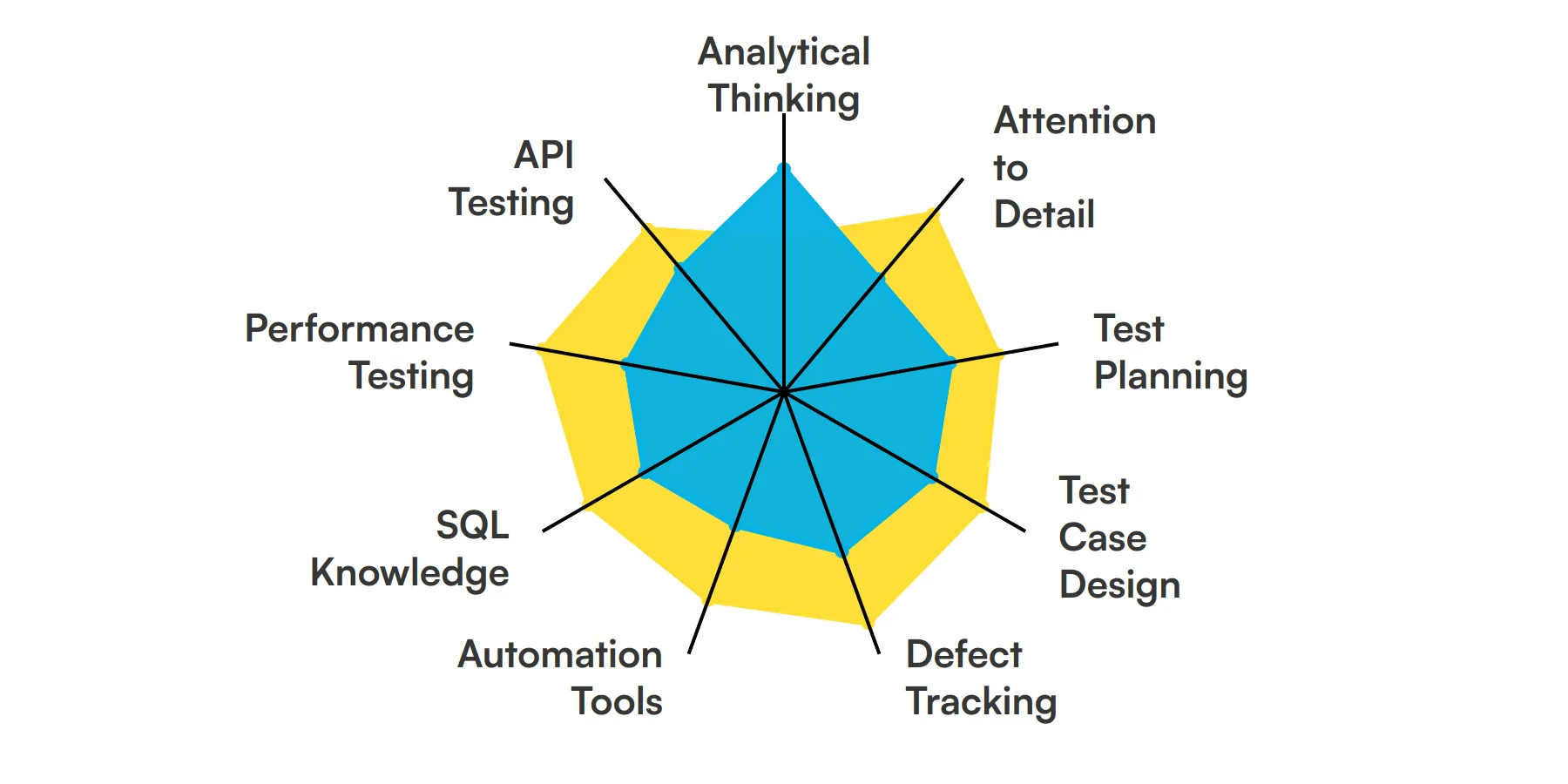
Analytical Thinking
A test analyst must possess strong analytical thinking to dissect complex systems and identify potential issues. This skill helps in understanding the root cause of problems and devising effective test strategies.
Check out our guide for a comprehensive list of interview questions.
Attention to Detail
Attention to detail is crucial for a test analyst to catch even the smallest of bugs that could affect the software's performance. This skill ensures that no aspect of the application is overlooked during testing.
Test Planning
Test planning involves outlining the scope, approach, resources, and schedule of testing activities. A test analyst uses this skill to ensure that all testing requirements are met within the given constraints.
For more insights, check out our guide to writing a Test Analyst Job Description.
Test Case Design
Designing test cases is about creating detailed, step-by-step scenarios to validate the functionality of the software. This skill helps a test analyst ensure comprehensive coverage of all possible use cases.
Defect Tracking
Defect tracking involves identifying, documenting, and managing bugs throughout the testing lifecycle. A test analyst uses this skill to ensure that all defects are addressed before the software is released.
Automation Tools
Proficiency in automation tools like Selenium or QTP is essential for a test analyst to automate repetitive test cases. This skill helps in increasing the efficiency and coverage of the testing process.
SQL Knowledge
Understanding SQL is important for a test analyst to validate data integrity and perform backend testing. This skill allows for querying databases to ensure that data is stored and retrieved correctly.
Check out our guide for a comprehensive list of interview questions.
Performance Testing
Performance testing skills help a test analyst evaluate the responsiveness, stability, and scalability of an application under various conditions. This ensures the software can handle real-world usage.
API Testing
API testing involves verifying that APIs meet functionality, reliability, performance, and security expectations. A test analyst uses this skill to ensure seamless integration between different software components.
11 secondary Test Analyst skills and traits
The best skills for Test Analysts include Communication Skills, Scripting Languages, Domain Knowledge, Risk Assessment, Version Control Systems, Usability Testing, Security Testing, Mobile Testing, Continuous Integration, Load Testing and Cross-Browser Testing.
Let’s dive into the details by examining the 11 secondary skills of a Test Analyst.
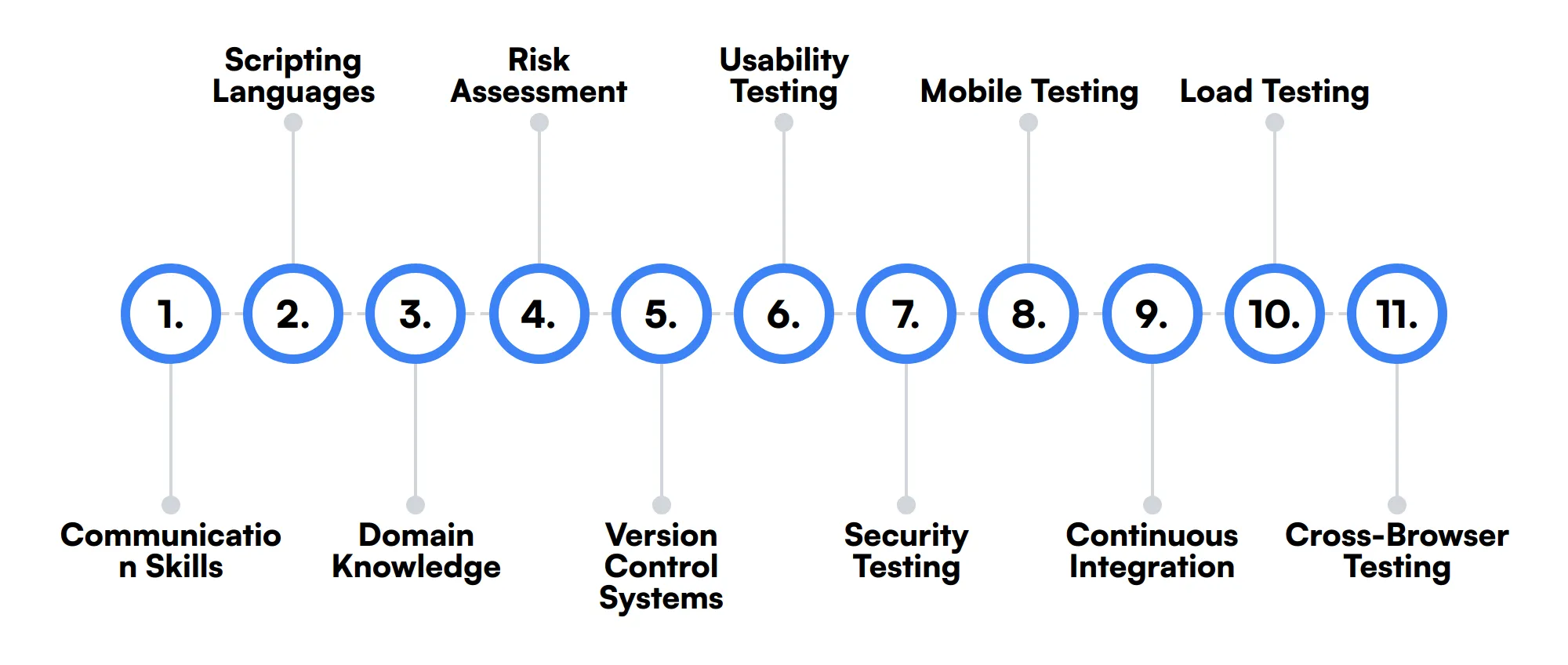
Communication Skills
Effective communication is important for a test analyst to convey findings and collaborate with developers and stakeholders. Clear communication ensures that issues are understood and addressed promptly.
Scripting Languages
Knowledge of scripting languages like Python or JavaScript can be beneficial for a test analyst in writing automated test scripts. This skill aids in customizing and extending testing frameworks.
Domain Knowledge
Understanding the specific domain of the application being tested helps a test analyst create more relevant and effective test cases. This knowledge ensures that the software meets industry-specific requirements.
Risk Assessment
Risk assessment skills enable a test analyst to identify potential risks in the software and prioritize testing efforts accordingly. This helps in focusing on the most critical areas that could impact the application.
Version Control Systems
Familiarity with version control systems like Git is useful for a test analyst to manage test scripts and collaborate with the development team. This skill ensures that changes are tracked and managed efficiently.
Usability Testing
Usability testing skills help a test analyst evaluate the user experience of the application. This ensures that the software is intuitive and user-friendly, meeting the end-users' needs.
Security Testing
Security testing involves identifying vulnerabilities in the software to prevent potential security breaches. A test analyst uses this skill to ensure that the application is secure and protects user data.
Mobile Testing
Mobile testing skills are important for a test analyst to validate the functionality and performance of mobile applications. This ensures that the app works seamlessly across different devices and platforms.
Continuous Integration
Understanding continuous integration practices helps a test analyst in automating the testing process and integrating it with the development pipeline. This ensures that code changes are tested continuously and issues are detected early.
Load Testing
Load testing skills enable a test analyst to evaluate how the application performs under heavy load conditions. This helps in identifying performance bottlenecks and ensuring the software can handle high traffic.
Cross-Browser Testing
Cross-browser testing skills are essential for a test analyst to ensure that the application works consistently across different web browsers. This ensures a uniform user experience regardless of the browser used.
How to assess Test Analyst skills and traits
Assessing the skills and traits of a Test Analyst can be a challenging task, given the diverse range of competencies required for the role. From analytical thinking and attention to detail to test planning and defect tracking, a Test Analyst must possess a blend of technical and soft skills to excel in their position.
Traditional resumes and interviews often fall short in providing a comprehensive view of a candidate's abilities. This is where skills-based assessments come into play. By leveraging tools like Adaface assessments, you can gain a clearer understanding of a candidate's proficiency in areas such as test case design, automation tools, SQL knowledge, performance testing, and API testing. Adaface on-the-job skill tests help you reduce screening time by 85%, ensuring you find the right fit for your team.
Let’s look at how to assess Test Analyst skills with these 6 talent assessments.
Analytical Skills Test
Our Analytical Skills Test evaluates a candidate's ability to analyze complex scenarios and data to make informed decisions. This test is designed to measure critical thinking and problem-solving skills, essential for roles requiring high-level analytical capabilities.
The test assesses candidates on various dimensions such as logical reasoning, data visualization, verbal and numerical reasoning, and data sufficiency. It challenges them to identify key information, apply logic, find patterns, and draw conclusions from the given data.
Successful candidates demonstrate a strong ability to handle numerical data, interpret verbal information, and engage in complex problem-solving. They show proficiency in synthesizing data and forming logical conclusions, which are key traits for analytical roles.
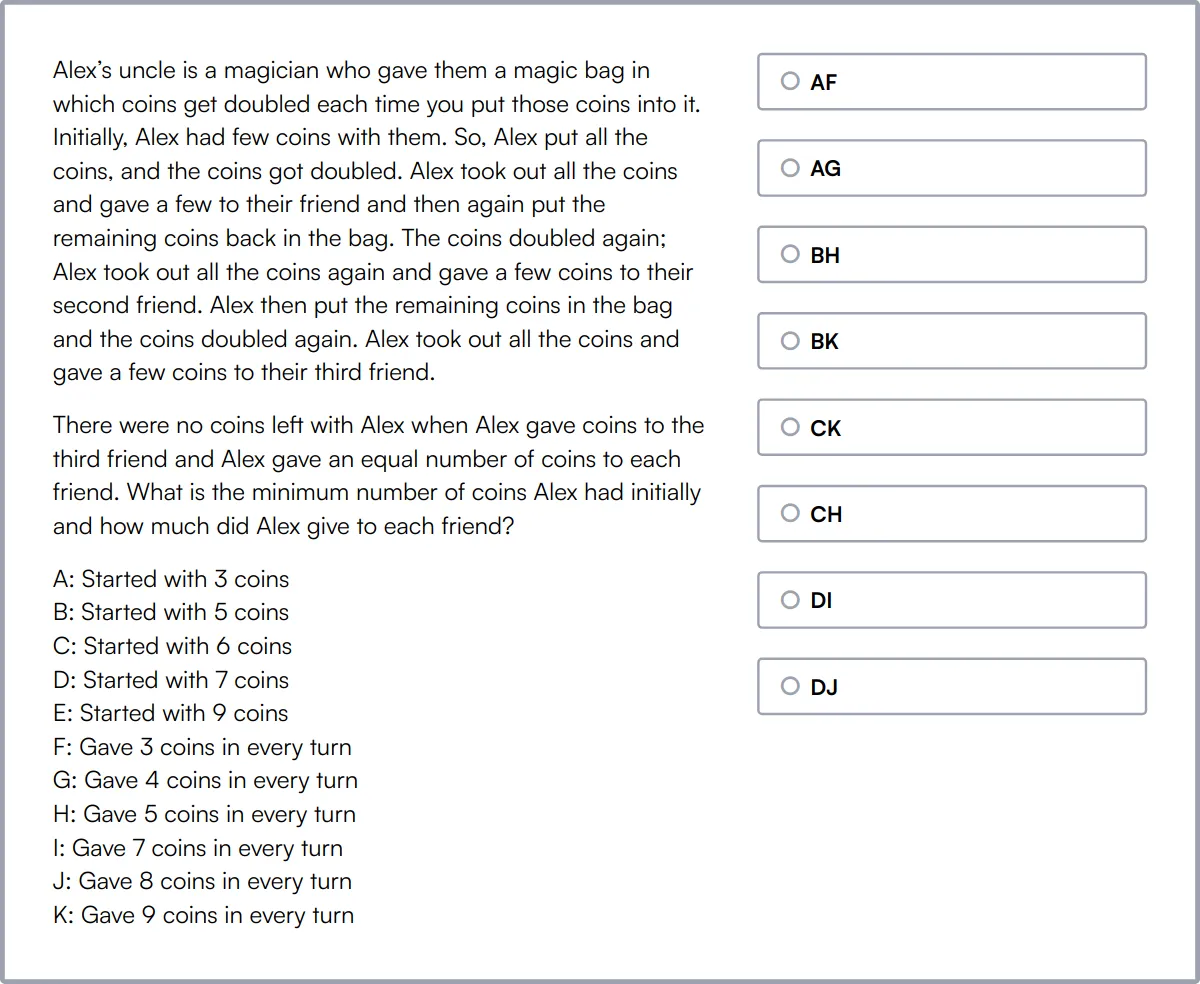
Attention To Detail Test
Our Attention To Detail Test assesses a candidate's meticulousness and accuracy in handling tasks. This test is particularly useful for positions where precision is paramount.
The test evaluates skills such as following instructions, verifying data, checking consistency, proof-reading, identifying mistakes, and detecting typos. It ensures candidates can maintain high quality and accuracy under detailed scrutiny.
Candidates who score well on this test are typically thorough, consistently produce error-free work, and are adept at catching and correcting errors, which is crucial for quality assurance and data verification roles.
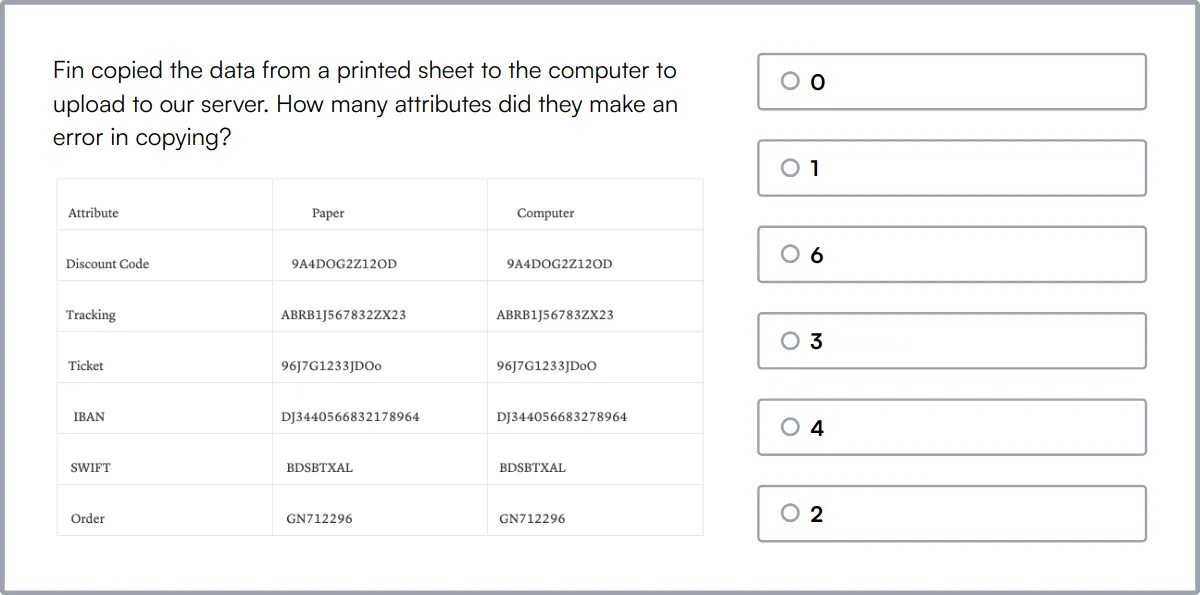
Quality Assurance Aptitude Test
Our Quality Assurance Aptitude Test is designed to evaluate a candidate's aptitude for quality assurance roles within the software development lifecycle. It measures their proficiency in both theoretical and practical aspects of software testing.
This test covers a broad range of topics including logical reasoning, analytical thinking, software testing, quality assurance, test planning, and defect tracking. It assesses the candidate's ability to design test plans, execute tests, identify defects, and utilize testing tools effectively.
High performers in this test are well-versed in various testing methodologies, demonstrate strong analytical skills, and are capable of managing complex testing scenarios and tools.
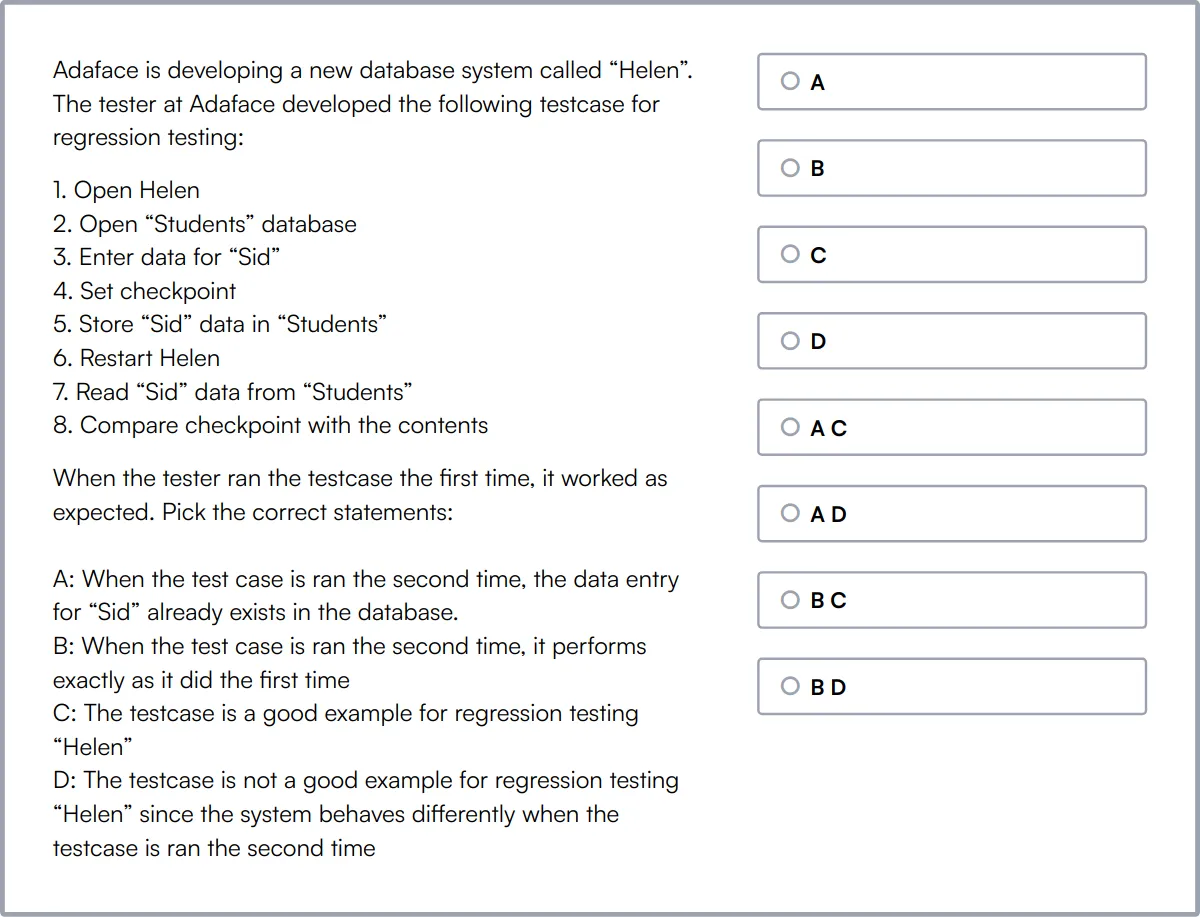
Manual Testing Online Test
Our Manual Testing Online Test assesses candidates on their expertise in manual testing methodologies and practices. It is tailored for roles that require rigorous manual testing of software applications.
The test evaluates knowledge in areas such as test case writing, test plan development, test management, and documentation skills. Candidates are tested on their ability to execute test cases manually, manage test environments, and document test results effectively.
Candidates excelling in this test show a deep understanding of different types of testing like mobile app testing and penetration testing, and are proficient in creating detailed test reports and managing test cases.
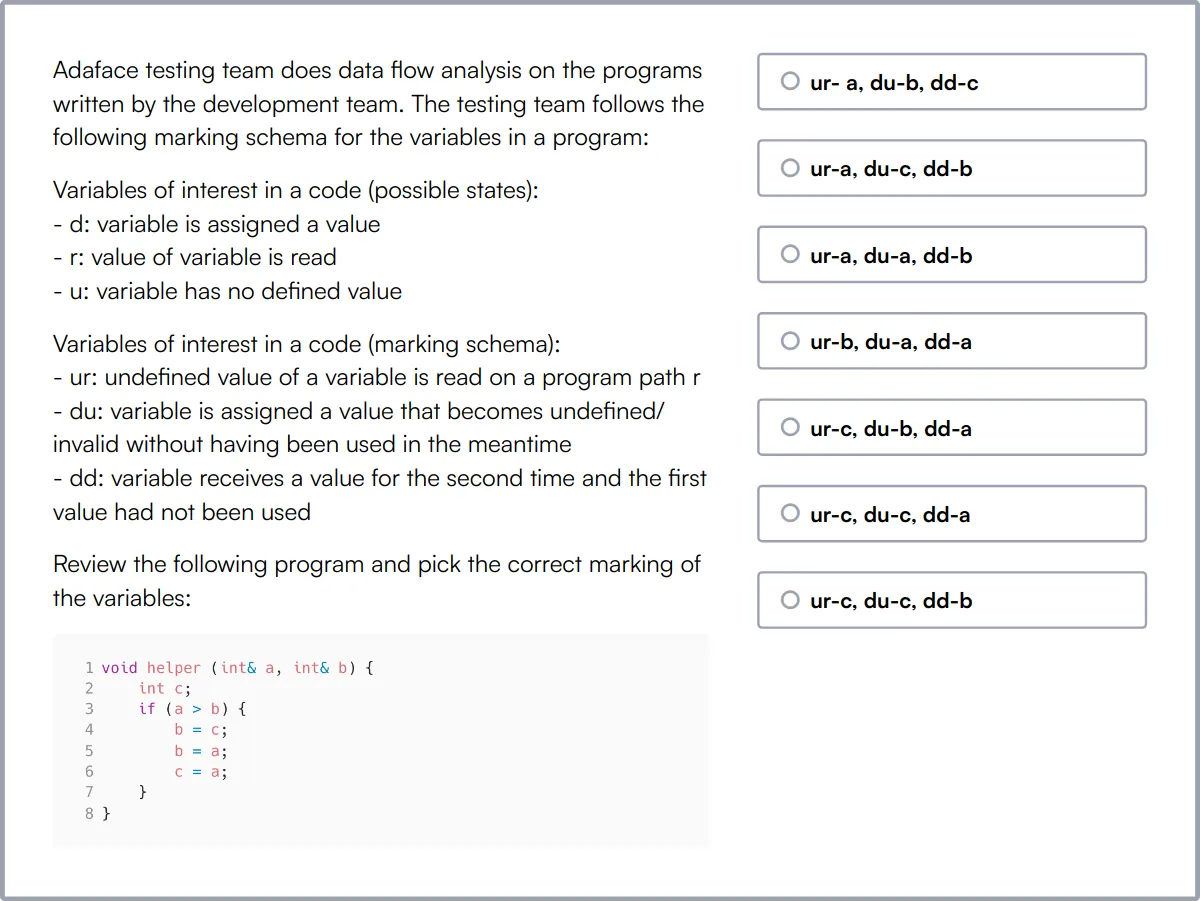
QA Engineer Test
Our QA Engineer Test evaluates a candidate's comprehensive understanding of quality assurance engineering. This test is crucial for identifying candidates with advanced QA skills and knowledge.
The test challenges candidates with scenario-based questions on test design techniques, software life cycle, QA programming, and tools like Selenium and Linux. It assesses their ability to plan, design, and execute test strategies effectively.
Successful candidates demonstrate proficiency in automation tools and programming, which are critical for modern QA processes and ensuring software reliability and performance.
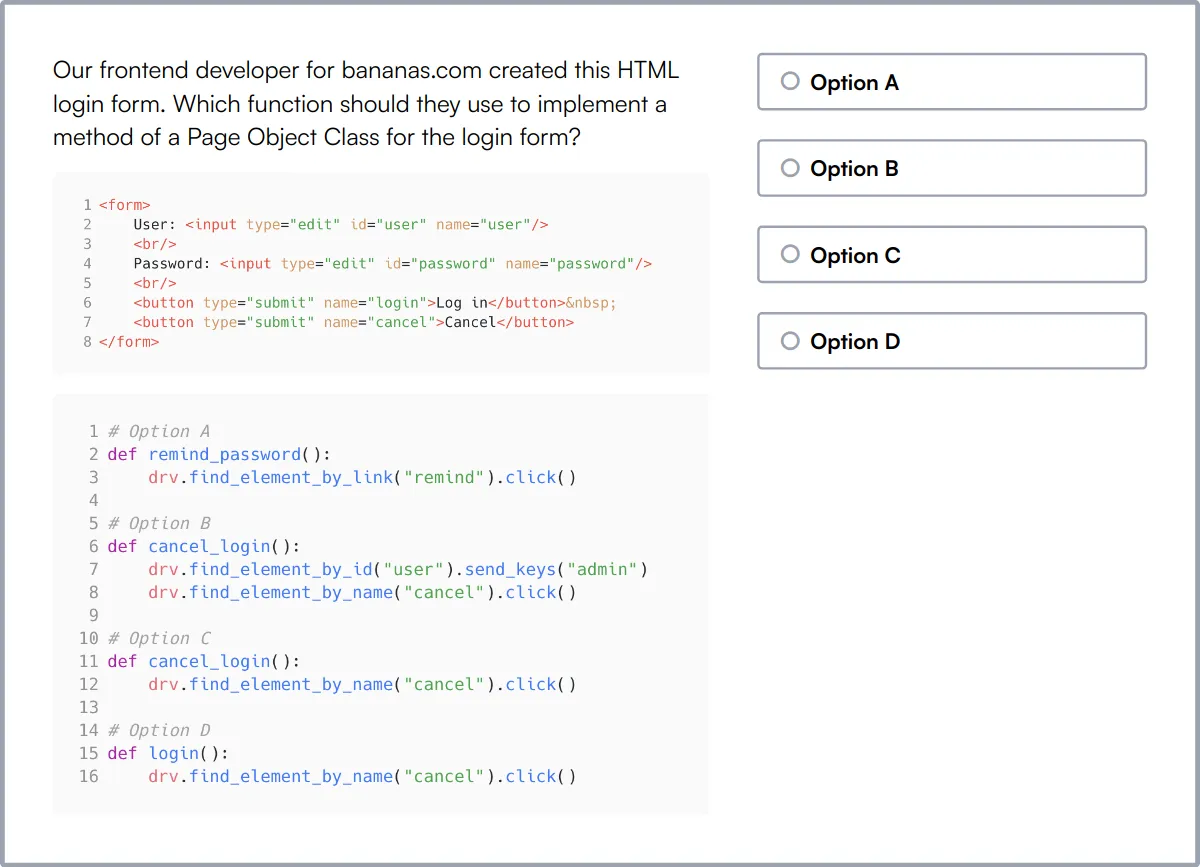
Selenium Online Test
Our Selenium Online Test is designed to assess candidates' skills in using Selenium for automation testing. This test is ideal for roles that require robust testing of web applications across different browsers.
It evaluates candidates on their knowledge of Selenium WebDriver, cross-browser testing, API testing, and performance testing. The test also covers framework building, including data-driven and hybrid frameworks, and customization of reports.
High-scoring candidates are proficient in developing and managing automation scripts, optimizing test operations, and enhancing the scalability and efficiency of test processes.
Summary: The 9 key Test Analyst skills and how to test for them
| Test Analyst skill | How to assess them |
|---|---|
| 1. Analytical Thinking | Evaluate problem-solving methods and decision-making processes. |
| 2. Attention to Detail | Check accuracy and thoroughness in task completion. |
| 3. Test Planning | Assess ability to strategize and organize testing phases. |
| 4. Test Case Design | Review creation of effective and comprehensive test cases. |
| 5. Defect Tracking | Observe methods for identifying, logging, and monitoring defects. |
| 6. Automation Tools | Test proficiency with automation software and scripting. |
| 7. SQL Knowledge | Examine ability to write and optimize SQL queries. |
| 8. Performance Testing | Measure skills in evaluating software speed and stability. |
| 9. API Testing | Assess understanding of API functions and integration testing. |
Financial Analyst Online Aptitude Test
Test Analyst skills FAQs
What is the importance of analytical thinking in a Test Analyst role?
Analytical thinking helps Test Analysts identify patterns, understand complex systems, and make data-driven decisions. It is crucial for troubleshooting and optimizing test processes.
How can recruiters assess a candidate's attention to detail?
Recruiters can assess attention to detail by giving candidates tasks that require precision, such as reviewing test cases for errors or inconsistencies.
What should be included in a test plan?
A test plan should include objectives, scope, resources, schedule, test environment, test criteria, and risk assessment. It serves as a roadmap for the testing process.
Why is defect tracking important in software testing?
Defect tracking helps in identifying, documenting, and managing bugs. It ensures that issues are resolved before the software is released, improving overall quality.
What are some popular automation tools for Test Analysts?
Popular automation tools include Selenium, QTP, JUnit, and TestComplete. These tools help in automating repetitive tasks and improving test efficiency.
How can SQL knowledge benefit a Test Analyst?
SQL knowledge allows Test Analysts to query databases, validate data, and ensure data integrity. It is essential for backend testing and data validation.
What is the role of communication skills in a Test Analyst's job?
Communication skills are important for collaborating with developers, stakeholders, and other team members. Clear communication ensures that issues are understood and resolved effectively.
How can recruiters evaluate a candidate's experience with performance testing?
Recruiters can evaluate performance testing experience by asking candidates about their use of tools like JMeter or LoadRunner and their approach to identifying performance bottlenecks.

40 min skill tests.
No trick questions.
Accurate shortlisting.
We make it easy for you to find the best candidates in your pipeline with a 40 min skills test.
Try for freeRelated posts
Free resources



